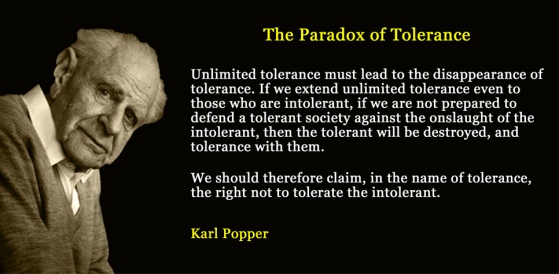The paradox of tolerance Culture, identity, ethnicity, gender, and religiosity should never be accepted as a basis for intolerance in political and civic aspects. In a modern democratic society, people belonging to these different groups must be able to rely on society to protect them against the abuses of intolerance. All citizens must have the freedom and right to question and leave their own group. Against those who do not accept this tolerance, we must be intolerant. In Sweden, we have embraced multiculturalism for a long time. If we mean by multiculturalism that there are several different cultures in our society, this does not pose a problem. Then we are all multiculturalists. But if we mean that cultural identity and affiliation also entail
Topics:
Lars Pålsson Syll considers the following as important: Politics & Society
This could be interesting, too:
Lars Pålsson Syll writes Schuldenbremse bye bye
Lars Pålsson Syll writes Vad historien lär oss
Lars Pålsson Syll writes Krigskeynesianismens återkomst
Lars Pålsson Syll writes From one old guy to another old guy
The paradox of tolerance
Culture, identity, ethnicity, gender, and religiosity should never be accepted as a basis for intolerance in political and civic aspects. In a modern democratic society, people belonging to these different groups must be able to rely on society to protect them against the abuses of intolerance. All citizens must have the freedom and right to question and leave their own group. Against those who do not accept this tolerance, we must be intolerant.
In Sweden, we have embraced multiculturalism for a long time. If we mean by multiculturalism that there are several different cultures in our society, this does not pose a problem. Then we are all multiculturalists.

But if we mean that cultural identity and affiliation also entail specific moral, ethical, and political rights and obligations, then we are talking about something completely different. Then we are talking about normative multiculturalism. And accepting normative multiculturalism also means tolerating unacceptable intolerance, as normative multiculturalism implies that the specific cultural groups’ rights may be given higher priority than the citizen’s universal human rights — and thus indirectly become a defence for these groups’ (potential) intolerance. In a normative multiculturalist society, institutions and regulations can be used to restrict people’s freedom based on unacceptable and intolerant cultural values.
Normative multiculturalism, like xenophobia and racism, means that individuals are reduced in an unacceptable way to being passive members of a culture or identity-bearing group. But tolerance does not mean that we must have a relativistic attitude towards identity and culture. Those who, in our society, show in their actions that they do not respect other people’s rights cannot expect us to be tolerant of them. Those who use violence to force other people to submit to a specific group’s religion, ideology, or ‘culture’ are themselves responsible for the intolerance they must be met with.
In Sweden, all women and men have equal value. And everyone living in Sweden must respect this.
Sweden is an open country, part of the global community. But it is also a country that firmly asserts that the gains we have achieved in terms of equality, openness, and tolerance over centuries are non-negotiable.
People who come to our country enjoy these rights and freedoms. But with these rights and freedoms also comes an obligation. Everyone — without exception — must also accept that in our country, there is one law — the same for everyone.
Rule of law.
If we are to safeguard the achievements of a modern democratic society, society must be intolerant towards people and organizations that promote intolerance. In a modern democratic society, the rule of law must prevail — and apply to everyone!
Against those in our society who seek to force others to live according to their own religious, cultural, or ideological beliefs and taboos, society must be intolerant. Against those who want to compel society to adapt laws and regulations to the interpretations of their own religion, culture, or group, society must be intolerant.
In almost no other country in the world is the protection for people with different religious affiliations as strong as in Sweden. It is a crucial part of our modern secular democracy.
